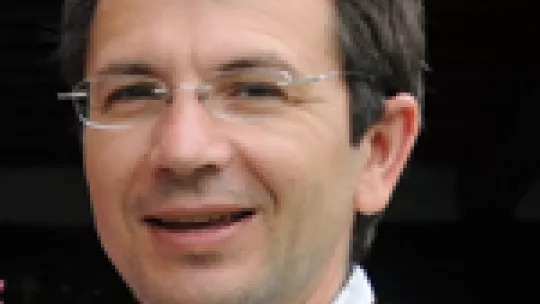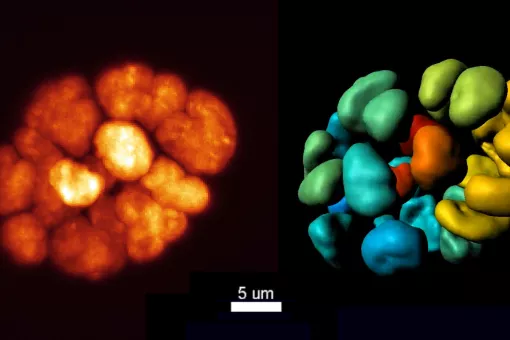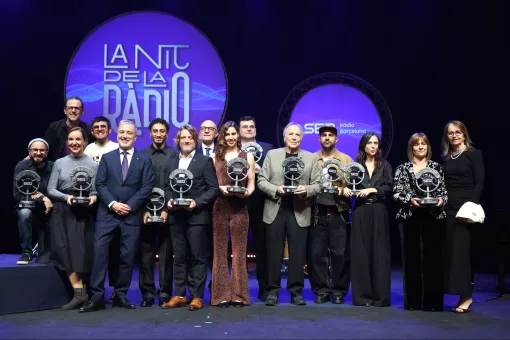Images
The scientist from Madrid will study the regulation of protein production and its role in diseases such as cancer.
This new hiring will boost interdisciplinary research in biomedicine performed in the centre.
During the next few weeks the ICREA researcher Raúl Méndez will put the final touches to his new “Translational Control of Cell Cycle and Differentiation” lab at IRB Barcelona. The scientist, who joins the institute from the Center for Genomic Regulation, is an international authority in gene regulation, a field in which he has been involved since doing his PhD more than 17 years ago.
With this new incorporation, the Molecular Medicine Programme now comprises six groups devoted to the study of the molecular mechanisms behind physiological processes and the diseases associated with them. “One of our objectives is to understand how some of the most basic processes in life are regulated, such as embryo development or cell division, and their possible role in the development of diseases such as cancer”, explains Méndez.
mRNA: the key link between genes and proteins in cell regulation
Cells in a living organism work thanks to information held in genes, which transfer this information to intermediary molecules called RNA messengers (mRNAs) to finally produce proteins. While all cells contain the same genes, only a subset of them is activated in order to produce the distinct proteins that a cell needs to function. Méndez’s field of interest lies in the control of information transfer performed by mRNAs to proteins (a process known as cell transduction). “We have demonstrated that 20% of gene expression is controlled by changes in the length of mRNA molecules. This finding highlights the relevance of this process in the functioning of living beings”.
Among his publications, special mention is given to studies published in prestigious journals such as Nature, Cell and Nature Cell Biology in 2008, in which he showed the exquisite temporal and spatial intracellular regulation of mRNAs, and in Nature Cell Biology in 2010, where he reported for the first time that these regulatory mechanisms occur not only during embryonic development but also in adult cells.
One of Méndez’s current priorities is the study of the relation between the processes that control protein production and several diseases, such as cancer. “Alterations in the translational control of mRNAs cause tumour expansion, and therefore their study is critical in order to understand cancer and to develop new therapies”. For this purpose, this researcher combines studies using the frog Xenopus Laevis, a highly useful animal model in biomedicine, with other studies in mice and human cells.
Attracting talent to IRB Barcelona
Raúl Méndez obtained his PhD from the “Centro de Biología Molecular 'Severo Ochoa'” in Madrid in 1993. He then moved to the U.S., where he did post-doctoral work at the Louisiana State University Medical Center and at the University of Massachusetts. In 2001 he returned to Spain to take up a post as group leader in the Center for Genomic Regulation, where he has remained until joining IRB Barcelona.
The extensive research performed by Méndez has earned him several awards, including the prestigious “2010 Carmen y Severo Ochoa Award for Research” and the “2008 Ciutat de Barcelona Award” for research. He is currently involved in several European projects, among which special mention is given to that granted by the Association for International Cancer Research for the study of mRNAs in the context of pancreatic cancer.
Raúl Méndez’s addition to IRB Barcelona complements to the recent incorporation of Ángel Nebreda to the Institute’s Oncology Programme. These hirings reflect the interest of the institute to attract scientific talent and to boost multidisciplinary research of excellence. IRB Barcelona is currently structured into 28 groups over five programmes that share common interests: Cell and Developmental Biology, Structural and Computational Biology, Molecular Medicine, Oncology, and Chemistry and Molecular Pharmacology. The 28 groups are supported by and receive technical assessment from six state-of-the-art scientific facilities that belong to the institute and that complement the services and platforms provided by the Barcelona Science Park, which hosts IRB Barcelona.
About IRB Barcelona
The Institute for Research in Biomedicine (IRB Barcelona) pursues a society free of disease. To this end, it conducts multidisciplinary research of excellence to cure cancer and other diseases linked to ageing. It establishes technology transfer agreements with the pharmaceutical industry and major hospitals to bring research results closer to society, and organises a range of science outreach activities to engage the public in an open dialogue. IRB Barcelona is an international centre that hosts 400 researchers and more than 30 nationalities. Recognised as a Severo Ochoa Centre of Excellence since 2011, IRB Barcelona is a CERCA centre and member of the Barcelona Institute of Science and Technology (BIST).





